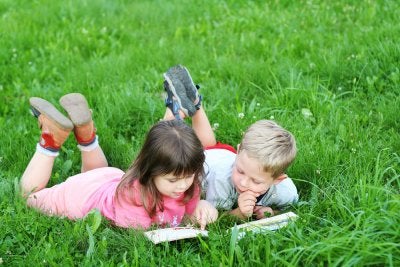-
Packing Snacks for Your Summer Camper
Summer camp is practically a rite of passage for kids. In Pembroke Pines, summer day camps feature lots of fun activities and opportunities for kids to make new friends. Unfortunately, it can be difficult for parents to get children to eat healthy foods while at summer camp. The trick is to make healthy snacks look fun to eat. You can see some demonstrations of this when you watch this interview with a registered dietitian.
She explains what she looks for in a healthy snack—primarily a combination of lean proteins and complex carbohydrates to give your child the energy needed for summer camp activities. For instance, you can add a little mustard to some low-sodium turkey slices, and wrap them around a thin, whole grain breadstick. Pack pepper strips and carrot sticks to dip into some low-sugar, plain or vanilla Greek yogurt. You could also stuff some granny smith apples, cinnamon, and low-fat ricotta cheese into a whole grain pita pocket.
-
Helping Your First Grader with Reading Skills
First grade is a pivotal year for literacy. Although struggling readers can always catch up, first graders generally establish themselves as competent or struggling readers during this year. You can support your child’s reading fluency and language comprehension by enrolling him or her in a high-quality first grade program in Pembroke Pines, but kids also need plenty of support at home. Talk to your child’s teacher about what you can do to support his or her success.

Writing Practice
First graders need lots of repetition and practice to get the hang of reading and writing fluently. Encourage your child put his or her new writing skills to use by asking for help with everyday tasks, like writing reminders on the calendar or adding items to the shopping list. Give your child a visually appealing journal to write in, and help him or her write short letters to grandparents or pen pals.
Word Games
Games are always an engaging way to entice kids to practice their literacy skills. Try Bananagrams, which involves word tiles contained within a “banana” pouch. Ask your child to write a story with you by taking turns adding one sentence to it. Start with a prompt, such as, “Jane was so excited when she woke up this morning because…” You could even create “mailboxes” for each family member. Fold a piece of construction paper in half, and staple the sides together to create a pocket that can be taped to a bedroom door. Household members can write silly notes to each other and “mail” them.
Critical Thinking Questions
Set aside some time each day to read with your child. Take turns reading from a favorite book and ask questions about the story that encourage critical thinking skills. Ask questions such as, “What do you think Jose will do next?” and “How do you think Gretchen felt when her friends did that?”
Screen Time
There are certainly some genuinely educational TV programs and computer games, but these are no substitute for a tangible book. Get your child off on the right foot by limiting screen time. Take your child to the library regularly for new materials he or she can explore during free play time. It never hurts to grab your own book to read silently as your child explores a new picture book or easy reader book.
-
Practicing Math Skills at Home
As your child reaches kindergarten age, his or her math skills become increasingly important . Your child doesn’t stop learning when he or she comes home from the kindergarten school in Pembroke Pines; use everyday activities to reinforce math skills. Kindergarten math introduces basic addition and teaches comparison, classification, and pattern recognition skills. Bake cookies together and ask your child to help you count as you add the ingredients. Ask simple math questions, such as, “If I already added one cup of flour and I add two more, how many cups of flour will be in the bowl?”
Success with kindergarten math necessitates the use of concrete items to teach skills, rather than abstract lessons. Ask your child to help you shop for groceries. While at the supermarket, point out some of the similarities and differences between types of fruit and ask your child for his or her own observances. If you purchase multiples of an item, ask your child to help you practice skip counting. These everyday activities help your child understand the relevance of math skills for daily life.

-
How Summer Day Camp Helps Your Child with Developmental Skills
If your child is currently attending preschool or kindergarten, you may be interested in finding fun, rewarding after school programs, summer activities for kids, and summer day camps in Pembroke Pines . Summer camps for kids offer a wide variety of benefits, including helping children gain confidence and build important new skills. Here is a look at how a kids’ summer camp can foster child development skills.

Focusing on Teamwork
Many of the summer camp activities in which your child will participate will allow him to work as part of a team. Participating in summer activities for kids that focus on teamwork will help your child understand the importance of cooperation, and will further develop his skills in communication, listening, and collaboration. Strengthening these skills will carry over into every other area of his life, whether he wants to play team sports, join the debate team, or participate in other kindergarten or preschool activities.
Engaging in Physical Activity
The younger your child is when he begins regularly engaging in physical activity, the more likely he is to develop a life-long love of being active. Playing sports, or simply running around with other kids his age during summer camp activities, will help your child stay fit, healthy, and strong. Regular physical activity can also help stimulate and build child development skills like confidence, poise, and balance. Your child will also develop a sense of structure, learn how to handle success and disappointment, and understand the value of working hard to reach a goal.
Exploring Creativity and Expanding Social Interactions
Most summer programs for kids offer some summer camp activities that focus on the arts. These summer activities for kids allow your child to explore and expand his creativity and perhaps strengthen or develop a new artistic skill. While participating in summer camp activities, your child will also expand his social interactions. He will meet a diverse group of kids that may share some of his same interests, and he will learn how to engage and communicate with children of different backgrounds.
-
Helping Your Child Prepare for Summer Day Camp
Summer camp in Pembroke Pines is a great way to ensure that your child has access to enrichment opportunities , supervised playtime, and other fun summer activities for kids. If this will be your child’s first experience at summer camp, it’s important to understand that he or she may feel a little nervous. You can help your child embrace the summer camp experience by letting him or her know what to expect. Contact the summer camp staff to inquire about activities or field trips that may be planned for your child’s particular program. Then, discuss these activities with your child and emphasize how much fun he or she will have.
Day camps do not require the extensive packing that overnight camps do; however, your child may need to bring snacks and a few personal items. The evening before camp, you can guide your child in choosing an outfit and getting together personal items to take. When you drop off your child at the camp, remind him or her of the time that you’ll be back.

RECENT POSTS
categories
- Uncategorized
- Early Learning Center
- Pre-K
- Children
- Child Care Center
- Preschooler
- Preschool Blog Category | Tanglewood Academy
- Preschool Lunch
- Tanglewood Academy
- After-School Program
- Toddler School
- Early Childhood Education
- preschool activities
- pre-kindergarten
- childhood education
- pre-kindergarten programs
- Children’s education
- enrichment opportunities
- Kindergarten
- Nurturing Education Environment
- Toddler Care
- Child Separation Anxiety
- Toddlers
- Summer camp
- summer activities
- VPK
- Voluntary Pre-K
- Outdoor Activities
- Smart Strategies
- Tie Shoes
- Snacks
- Physical Activities
- Education
- Enrichment Activities for Kids
- Early Education Activities
- Preschool Curriculum
- Classroom Learning
- APPLE accreditation
- Language Comprehension
